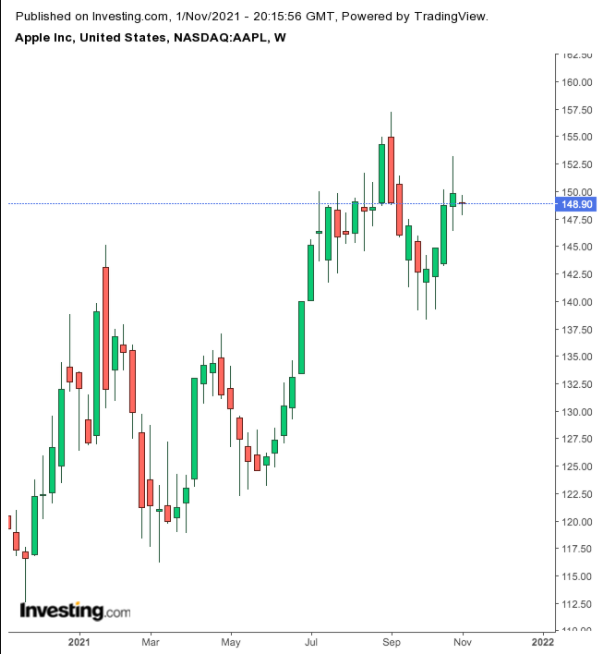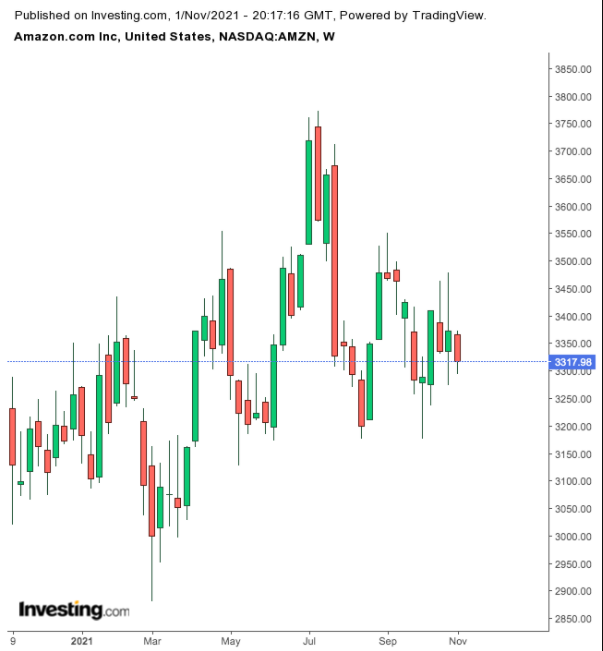United Homes Group stock plunges after Nikki Haley, directors resign
After both Apple (NASDAQ:AAPL) and Amazon.com (NASDAQ:AMZN) each had a powerful run since the market’s crash in March 2020, their shares have been going through a rough patch. Sales for both companies are slowing down due to global supply disruptions and cost escalations.
Below we take a look at these two mega-cap technology stocks, which together account for about 10% of the market value of the S&P 500. The goal is to understand which stock is better positioned to outperform in the post-pandemic world, especially following their latest earning setbacks.
Apple Shares Take A Break
After surging about 70% last year, the iPhone-maker’s shares have taken a break this year. Against the tech-heavy NASDAQ’s gain of 20%, Apple stock is up just 12%. It closed on Monday at $148.96.

This underperformance is not without reasons. Now the world’s second-most valuable company after Microsoft (NASDAQ:MSFT), Apple is struggling to meet the soaring demand for its products amid chip shortages and supply disruptions caused by the global pandemic.
Apple told investors last week it lost $6 billion in sales in the final quarter of its fiscal 2021 because it can’t meet demand for its products, and could lose more during the upcoming, crucial holiday season due to supply-chain problems.
Chief Executive Officer Tim Cook attributed the crunch to the chip shortage and COVID-19’s impact. A lack of semiconductors is affecting “pretty much most of our products currently,” he said on a conference call last Thursday. “Demand is very robust.”
Though the California-based Apple missed on analysts’ sales estimates for Q4, they still grew a whopping 29% from the same period last year.
Amazon Facing Cost Pressures
Just like Apple, Amazon.com also faced a challenging environment during the past quarter as the world’s largest e-commerce company struggled to contain costs.

It posted lower-than-expected sales during Q3 and signaled that a tight labor market and supply-chain disruptions would weigh on earnings during this season. For Amazon, it seems the road ahead is bumpier than for Apple as the e-tail juggernaut faces a potential shift in consumer behavior after a very strong jump in online shopping during the pandemic.
As the economy gets back to normal after lockdowns and restrictions, it’s difficult to predict how much of the sales surge will stick.
In addition, the Seattle-based tech company told investors that it is incurring several billion dollars of additional costs while it manages through labor supply shortages, increased wage costs, global supply-chain issues, and increased freight and shipping costs.
These obstacles have kept investors on the sidelines this year, pressuring Amazon stock. It rose just 6% this year, underperforming both Apple and the NASDAQ Index. It closed on Monday at $3,318.11.
Which Is A Better Buy?
Amazon and Apple are both among the most resilient tech giants and each is positioned to grow in the post-pandemic environment. Apple’s growing services business and the new 5G growth cycle will fuel sales, while Amazon’s dominant position in e-commerce, coupled with its cloud business, provide ample opportunities for increased sales.
That being said, the consensus in the market is that it will take longer for Amazon to get back to an upside trajectory than Apple. Data from the past 20 years shows that when Amazon’s quarterly earnings miss estimates, the stock more often than not falls over the next month.
The same isn’t true for Apple, according to a Bloomberg analysis which says:
“Amazon’s EPS has missed on 39 occasions over the past two decades, shedding a mean 2.3% over the following month. Apple, on the other hand, has missed in just 13 quarters, with the stock gaining most of the time, rallying a mean 3.9%.”
An additional reason making Apple a better buy: at this point, demand for its new products continues to be very strong, helped by its latest new product launches. Share prices, as well as upside growth, will come back once those products are available, meaning sales are just being delayed and not lost.
